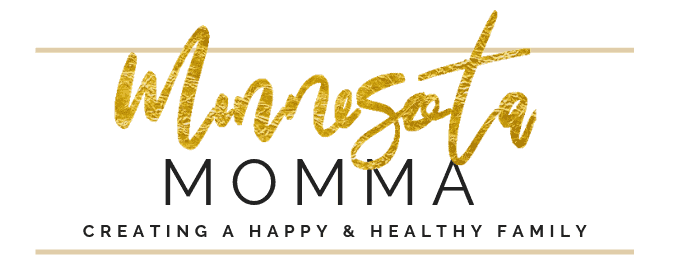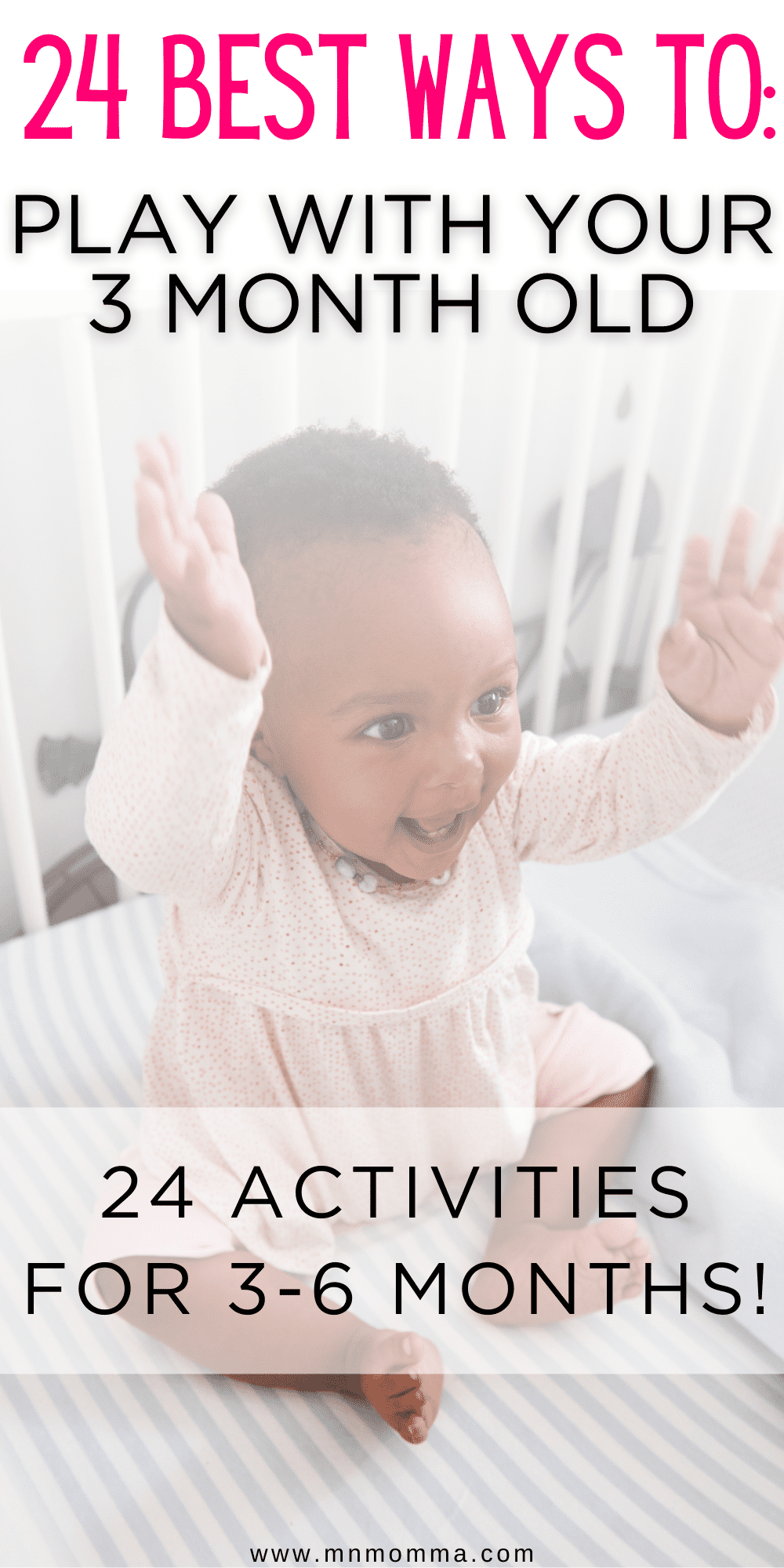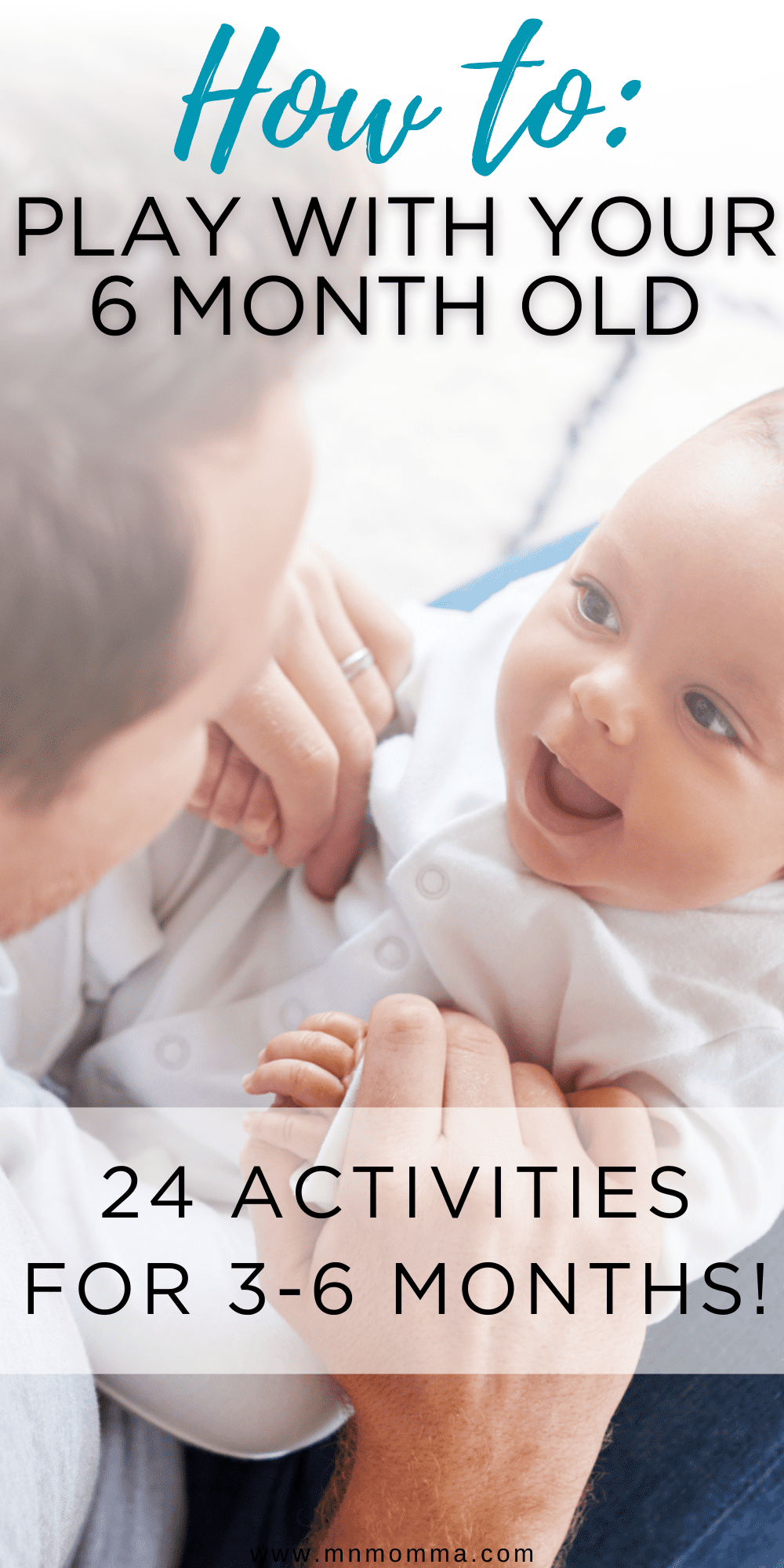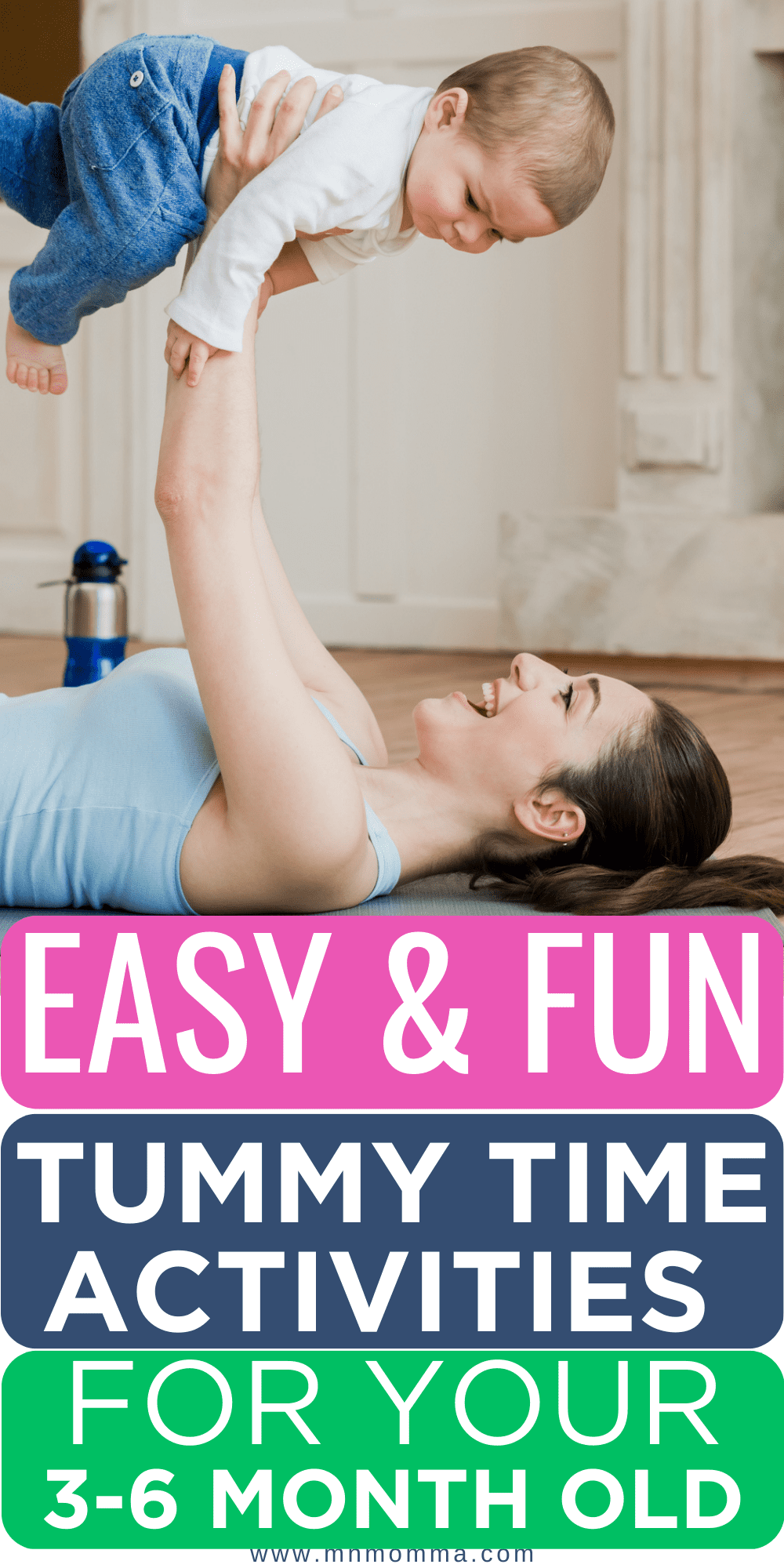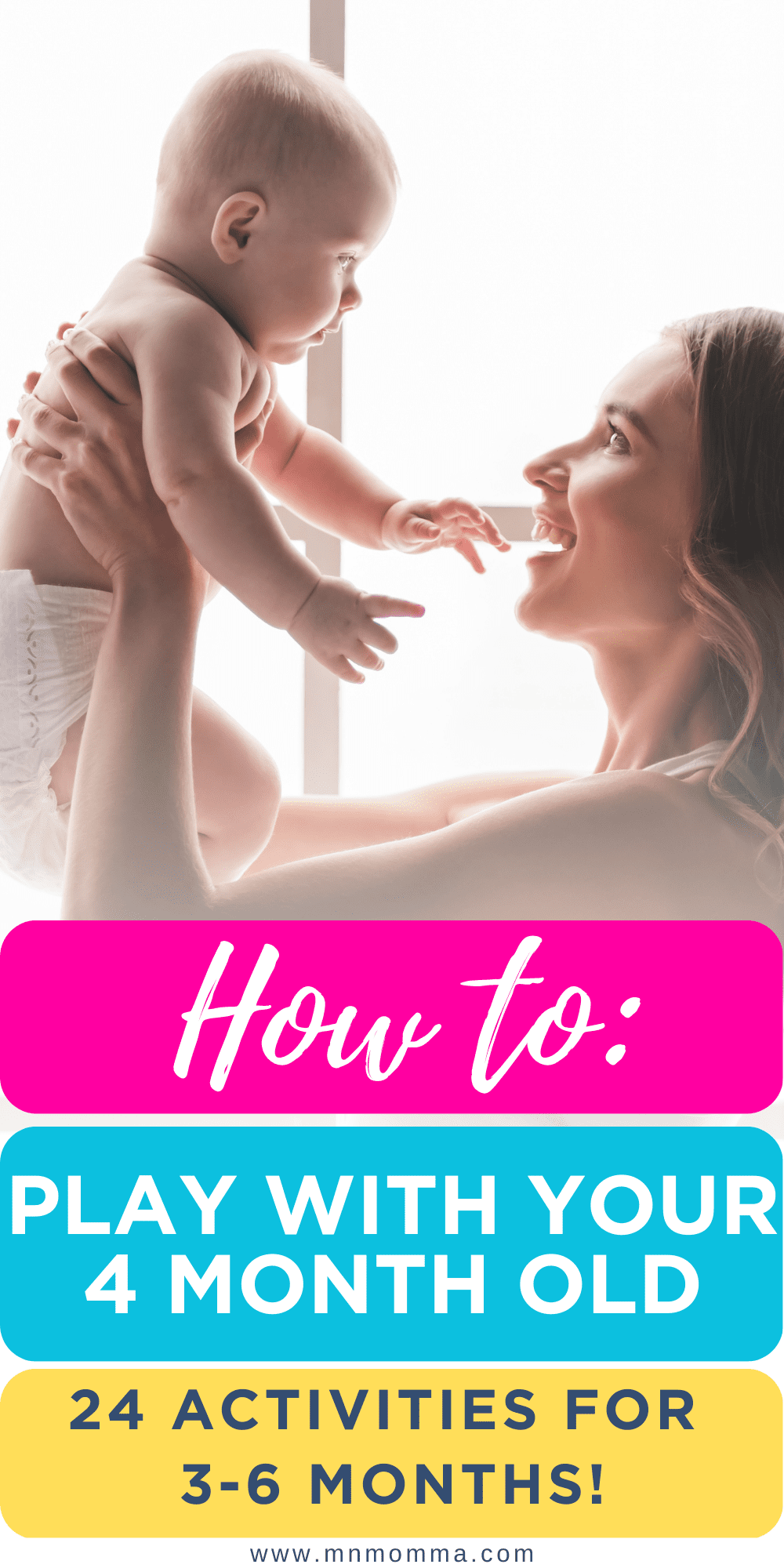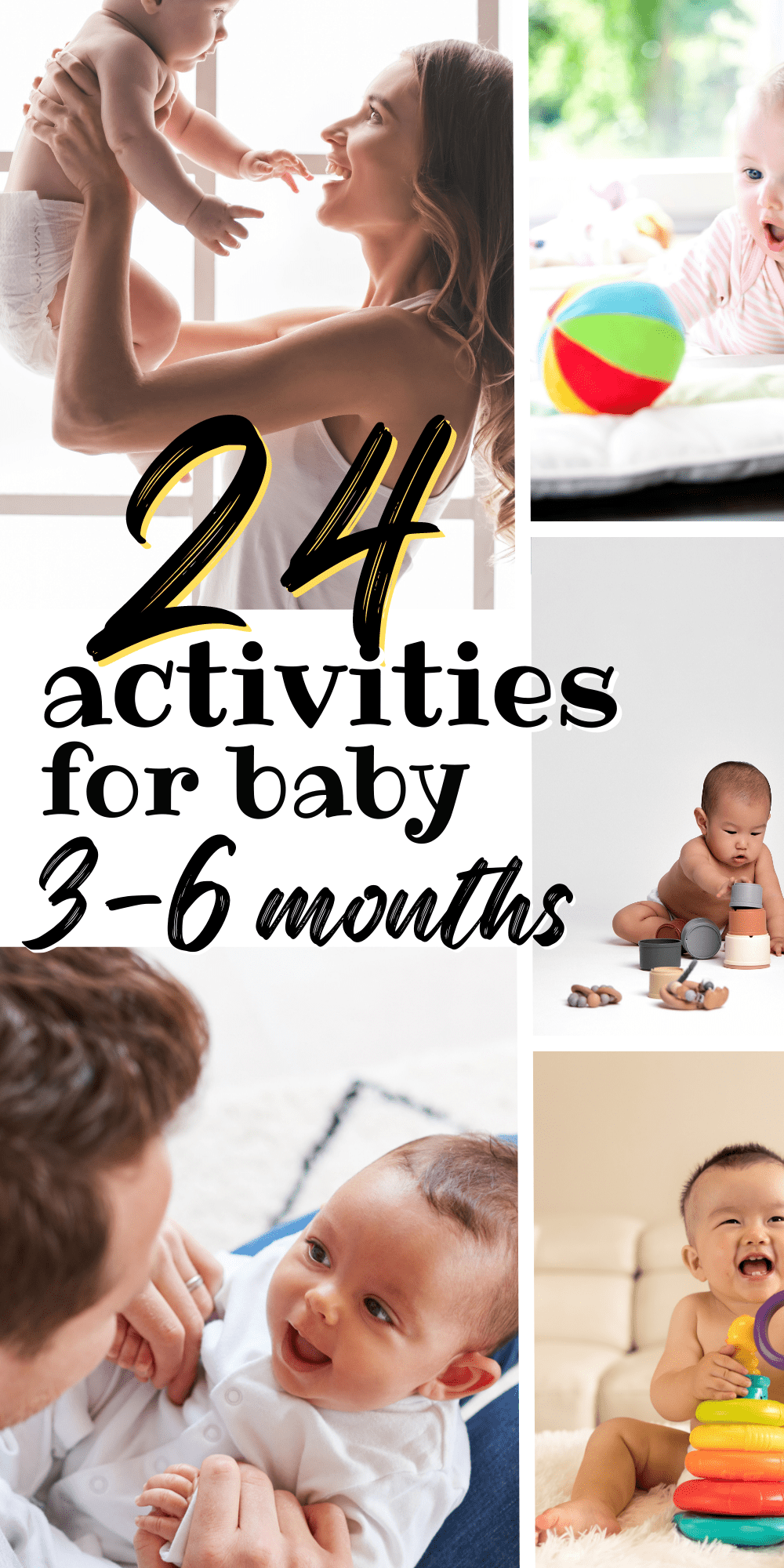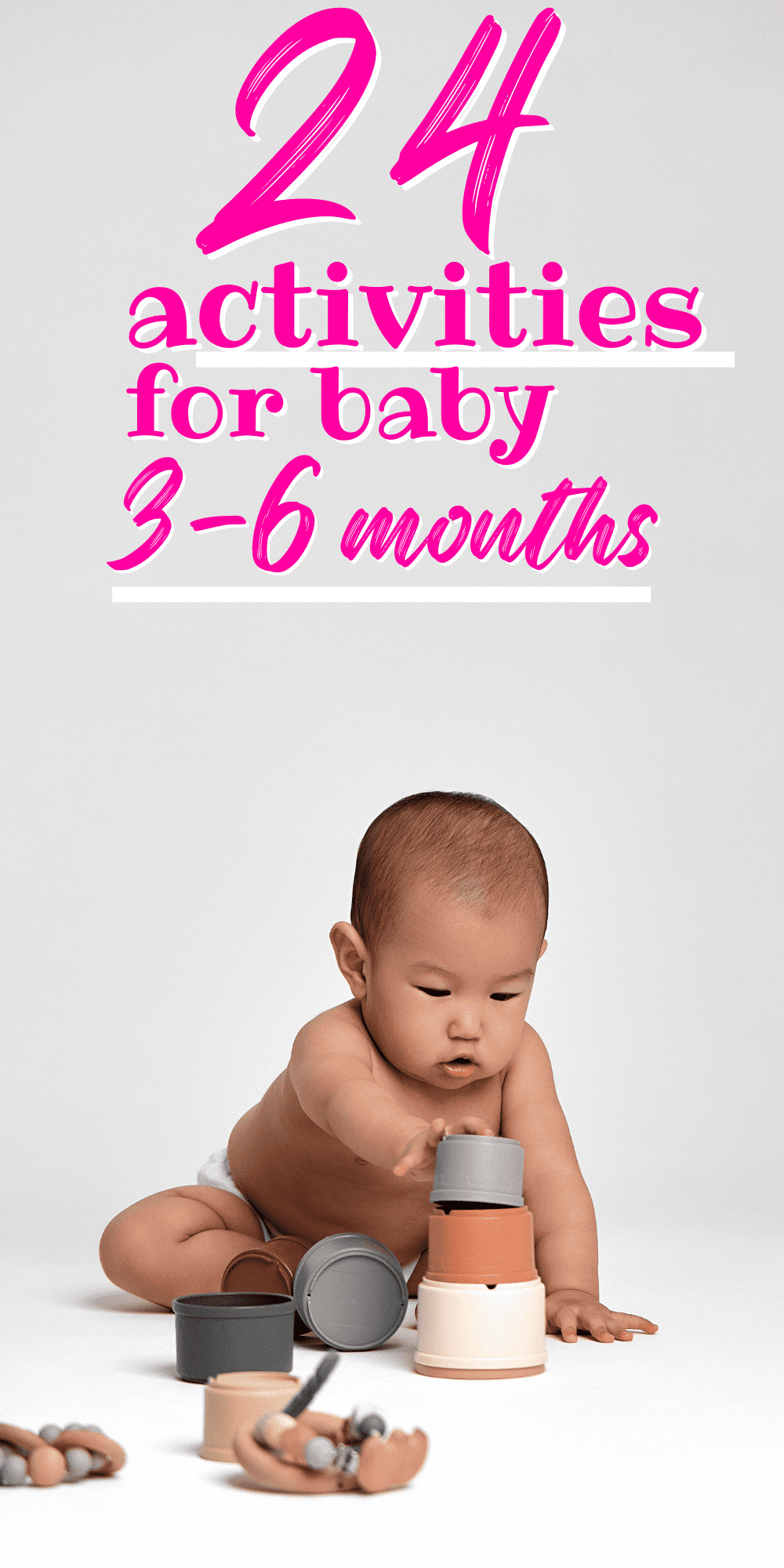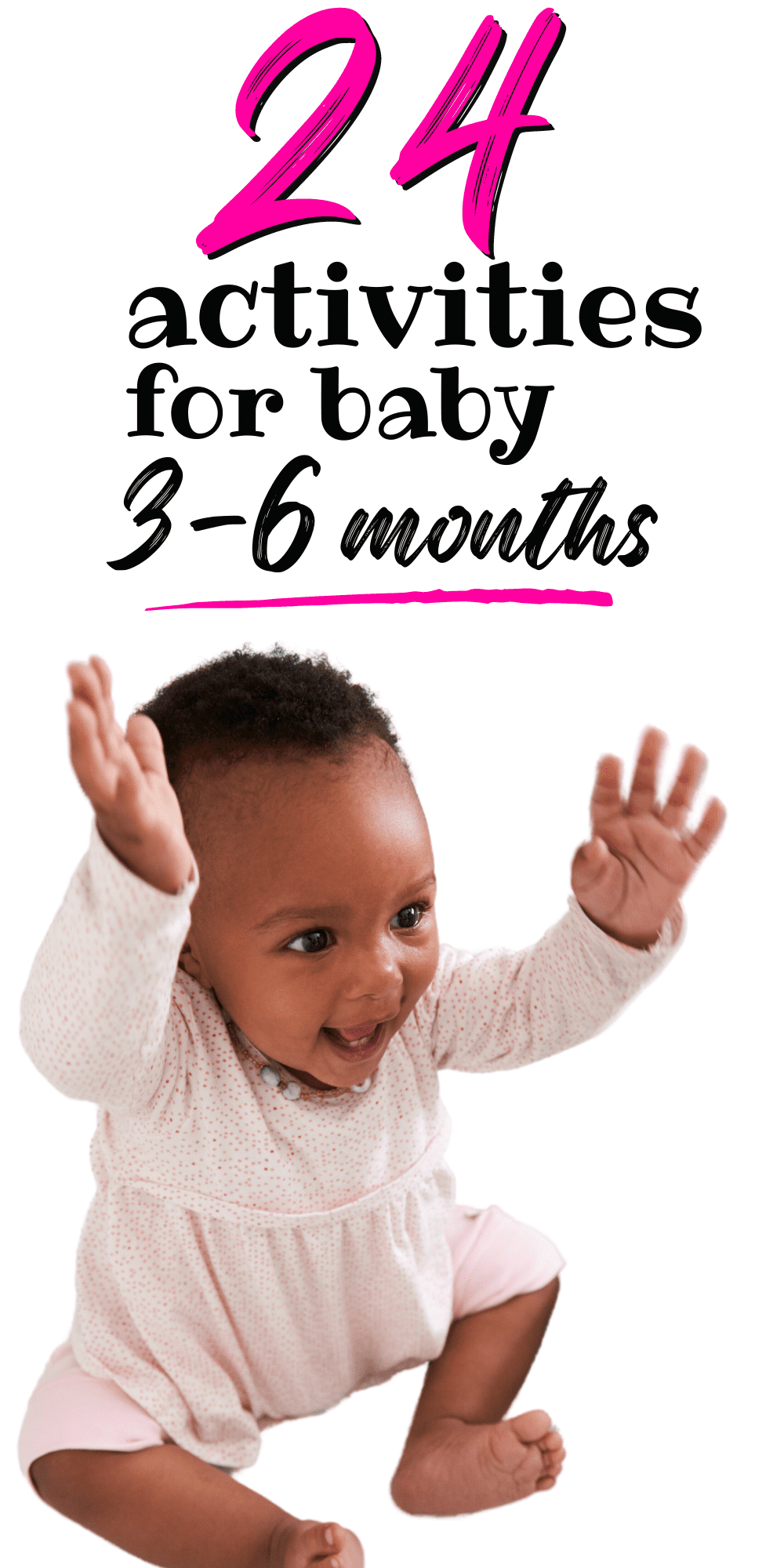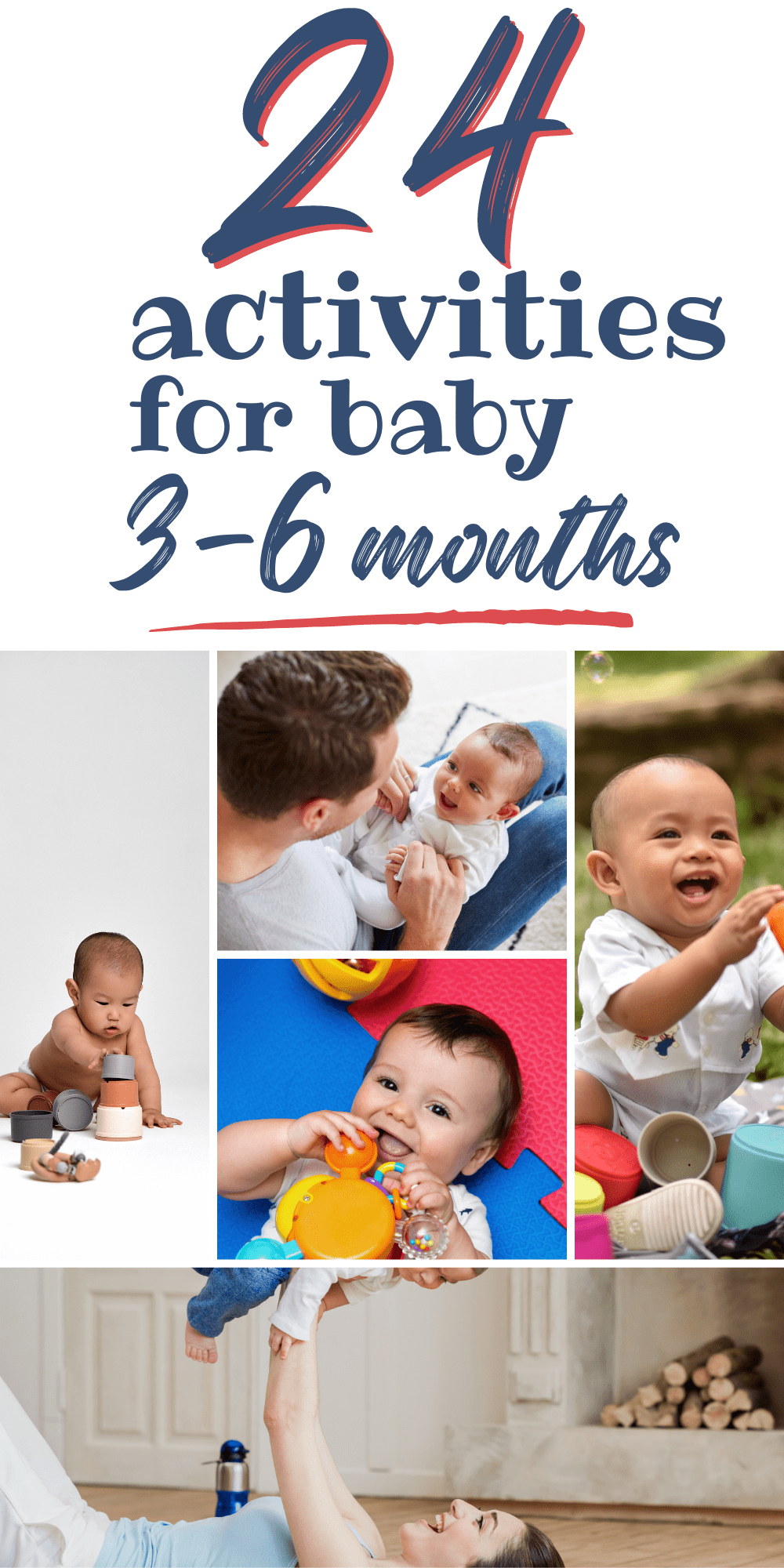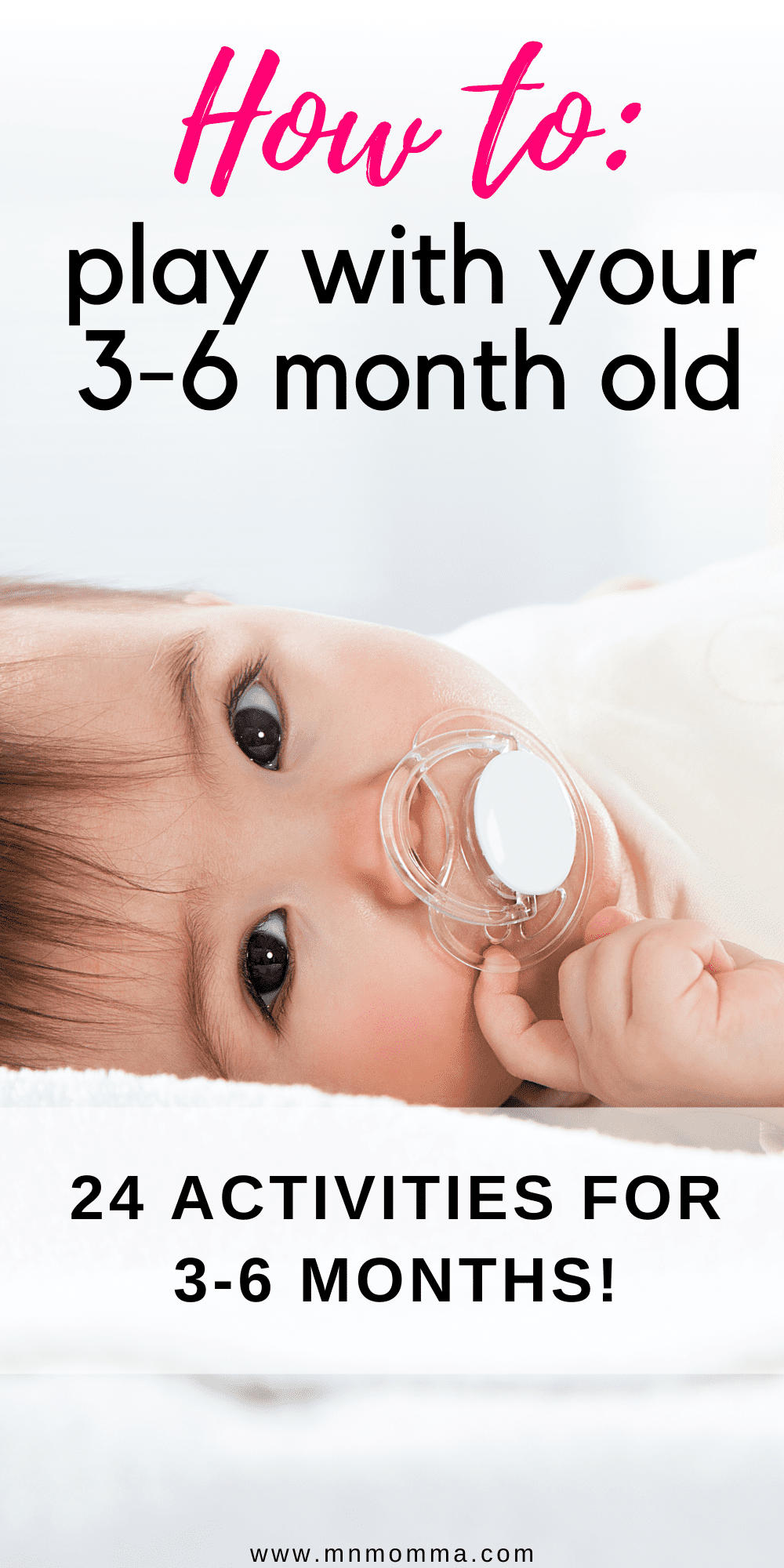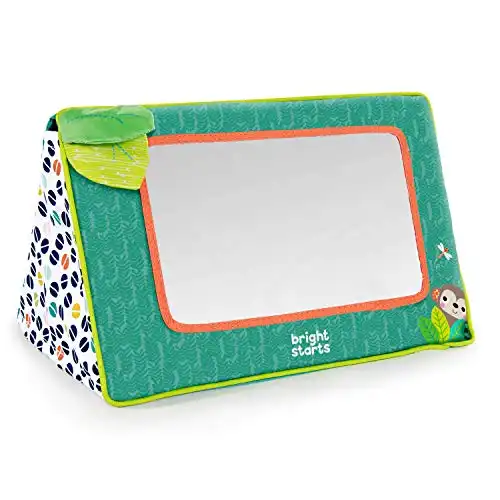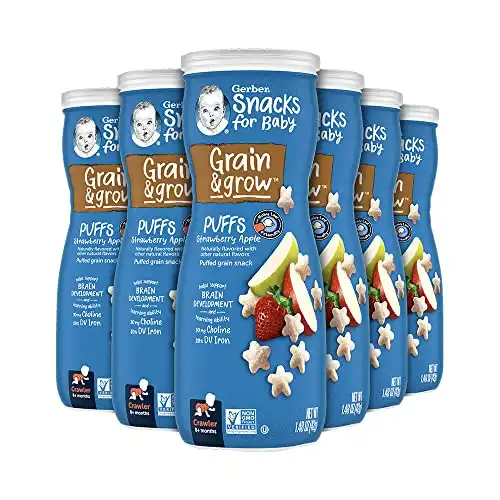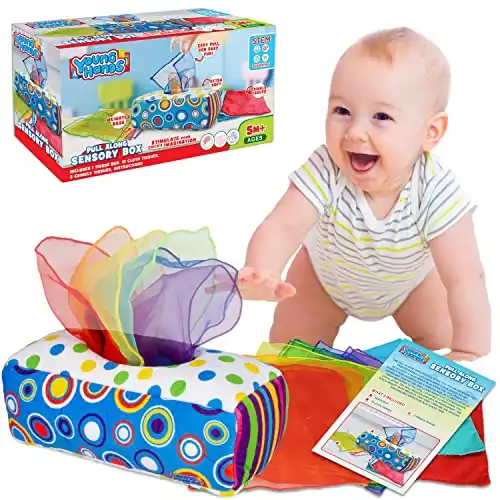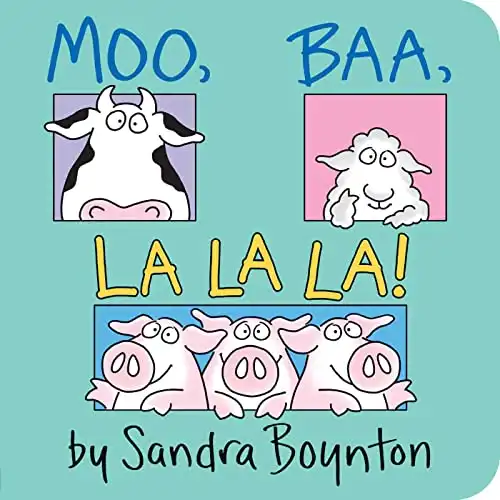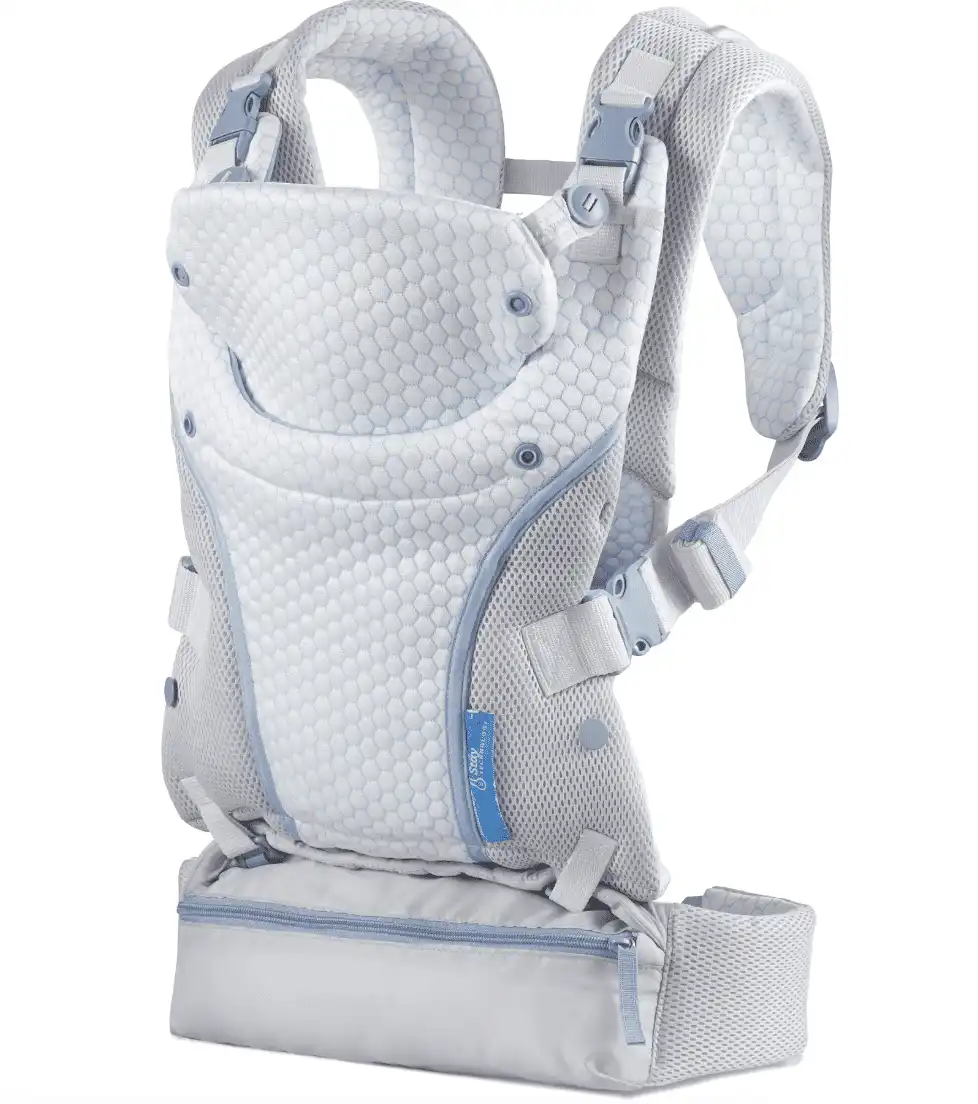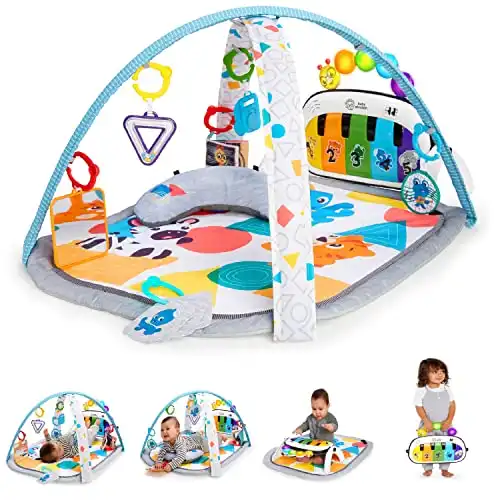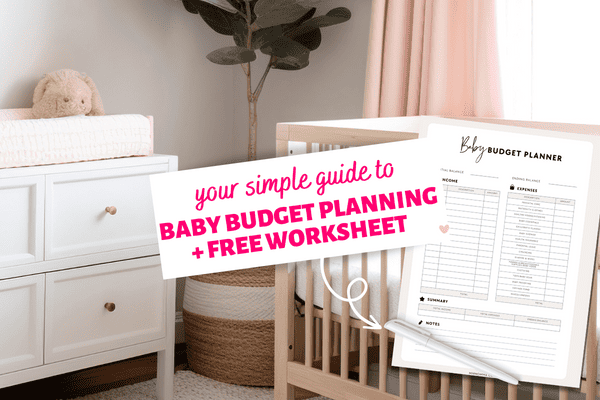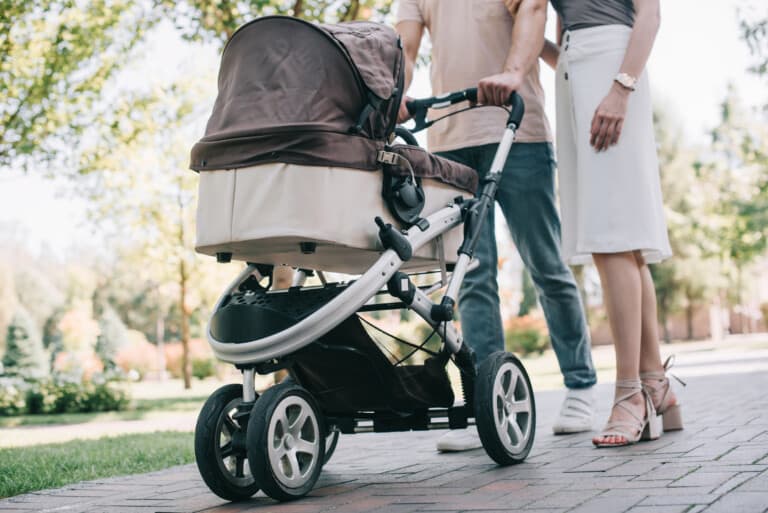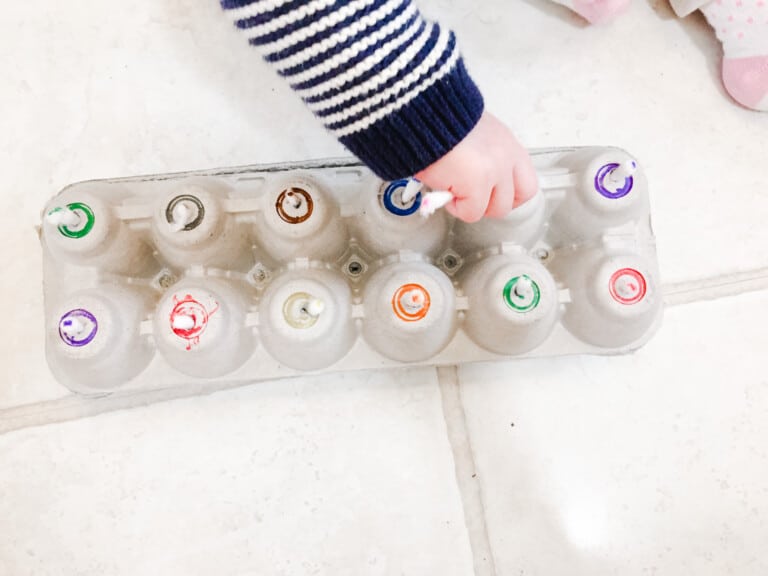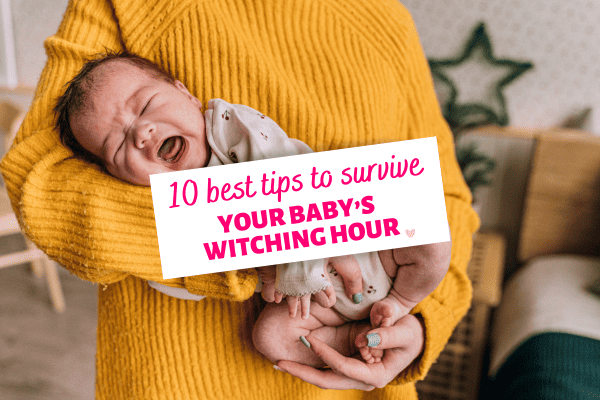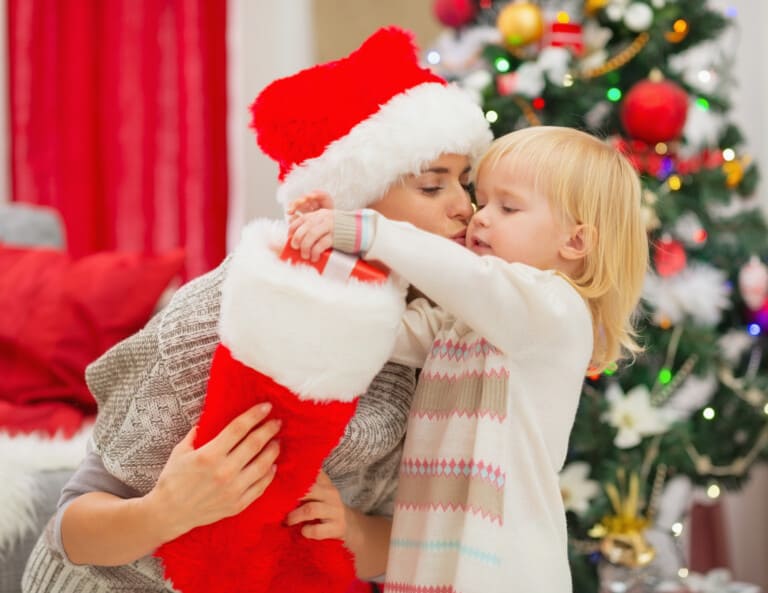24 Activities for 3-6 Month Olds (Fun Ways to Play With Your Baby)
Disclosure: This post may contain affiliate links, which means I may receive a small commission if you click a link and purchase something. Please check out my disclosure policy for more details. All opinions are my own!
Welcoming a new addition to the family is an exciting time, and watching your little one grow and develop is one of the best adventures of parenthood.
At 3-6 months of age, your baby is beginning to become more alert and curious about the world around them.
As a parent, you may be wondering what activities you can do with your little one to help them explore and learn. Or maybe the days are just seeming long and you’re wondering what to do with a 3 month old all day.
Either way – you’re in good company of looking for the best activities to keep young babies learning and developing.
Here’s a great list of activities you’ll want to check out that are perfect for babies between 3-6 months old.
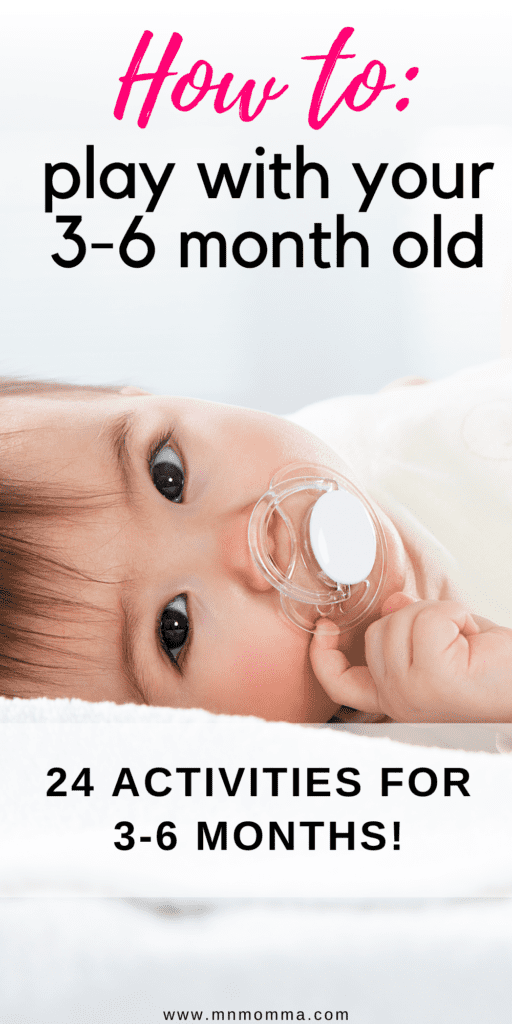
<—Pin it! Save this post for later!
Baby’s Development: 3-6 Months
Between 3 and 6 months, babies undergo huge physical, cognitive, and emotional development.
One of the most noticeable changes is that they begin to gain better control over their movements, especially their arms and legs. Making them much better at trying to reach and grasp objects.
They may also start to roll over from their stomach to their back and vice versa.
Cognitively, babies at this age are developing their sense of spatial awareness and hand-eye coordination.
They may begin to recognize faces and show interest in toys and other objects, using their new motor skills to manipulate them.
They may also start to babble and coo, as they practice using their voice and learning to communicate with others.
Emotionally, babies at this age are becoming more aware of their surroundings and may become upset when separated from their mom or dad.
They may also start to exhibit more complex emotions, such as joy, anger, and frustration.
To help support their development, parents and caregivers can provide plenty of opportunities for play and exploration, as well as lots of love and attention.
What Your Baby Can’t Do Yet (3-6 Months Old)
- Sit up without support
- Crawl or walk
- Feed themselves with a spoon or fork
- Understand complex language or follow instructions
- Speak in full words or sentences
- Fully control their hands and fingers to manipulate small objects
- Stand without assistance
- Chew solid foods (they still need to stick to purees or soft solids)
- Fully regulate their emotions and reactions to stimuli
- Show full object permanence (understanding that an object still exists even when it’s not visible)
Remember that every baby develops at their own pace and some may reach these milestones sooner or later than others. It’s important to provide a safe and stimulating environment for your baby to explore and grow at their own pace.
What Your Baby Can Do! (3-6 Months Old)
- Lift their head and chest when lying on their stomach
- Roll from their stomach to their back and vice versa
- Reach and grab for objects with their hands
- Explore toys and objects by mouthing and grasping them
- Follow moving objects with their eyes and turn their head towards sounds
- Recognize familiar faces and voices
- Begin to babble and coo, experimenting with their vocal cords
- Smile and laugh in response to positive stimuli
- Show interest in social interaction and games, such as peek-a-boo
- Show more control over their movements, such as waving their arms and kicking their legs
- Sleep for longer stretches at night and take shorter, more frequent naps during the day
- Develop their sense of spatial awareness and hand-eye coordination
Again, remember that every baby develops at their own pace and may reach these milestones sooner or later than others. It’s important to provide a supportive and nurturing environment for your baby to grow and develop at their own pace.
24 Ways to Play With Your 3-6 Month Old
As a parent, you may be wondering how you can engage your 3-6 month old in playtime activities that promote healthy development.
The good news is that there are plenty of fun and easy ways to play with your little one!
Here are 21 great activities that will help promote your baby’s cognitive, physical, and social development.
1. Play With Toys Together
Use your baby’s favorite toys to encourage visual tracking.
Move the toy around in different directions to keep your baby’s eyes following.
Just simply being together and interacting with your baby is amazing for your infant’s development.
2. Incorporate Daily Routines Into Playtime
It’s always a good idea to turn your regular day activities into fun learning time with your baby.
It can be as simple as talking about what you see on a walk outside or explaining what you’re doing while folding laundry – believe it or not, just these simple conversations can enhance baby’s language development.
3. Place toys near your baby during diaper changes.
Let your baby look at toys or try to reach for them while you’re changing diapers. This is a great activity.
4. Sit with Baby and Play Patty Cake
Play with your baby in the sitting position to help build neck and core strength.
Sweet nursery rhymes like patty cake or the itsy bitsy spider are perfect for this activity.
5. Mirror Mirror
Let your baby check himself or herself out. Grab an unbreakable mirror and set it up for baby to see themself.
This can be a perfect time to practice facial expressions and social development.
6. Puffs or Cheerio Grab
Your baby is probably just beginning to work on grabbing objects, so give them a chance to keep practicing!
Using puffs, yogurt bites, or cheerios that fit easily in your baby’s hand can be a great way to promote pincer grasp and fine motor skills. Remember to avoid small toys that can be a choking hazard.
7. Play Peekaboo!
Baby learning doesn’t have to be complicated. A fun game of peekaboo is a simple game that will make your baby’s face light up and is a classic game that babies love.
It helps with their understanding of object permanence and can also help develop their social skills.
You can play this game by hiding your face behind a blanket or your hands and then revealing yourself with a big smile and saying “peek-a-boo!”
8. Try Sensory Play for 3-6 Months Old
Babies at this age are fascinated by new textures and sounds. You can create a sensory box with a variety of soft and hard objects for your baby to explore.
You can also make your own sensory bags using colorful gel or water-filled bags to help stimulate your baby’s senses.
9. Incorporate Music
Musical toys are great for stimulating your baby’s auditory senses and can be a fun idea for playtime.
We use our Google Home all the time and ask it to play “Children’s nursery rhymes” and love it.
10. Sing Songs Together
Incorporate children’s songs like “Itsy Bitsy Spider” into playtime to help with language skills. Clap and play with your baby’s hand to help develop hand muscles and fine motor skills.
11. Use New Sounds
Use different sounds, such as clapping or snapping, to capture your baby’s attention and promote auditory development.
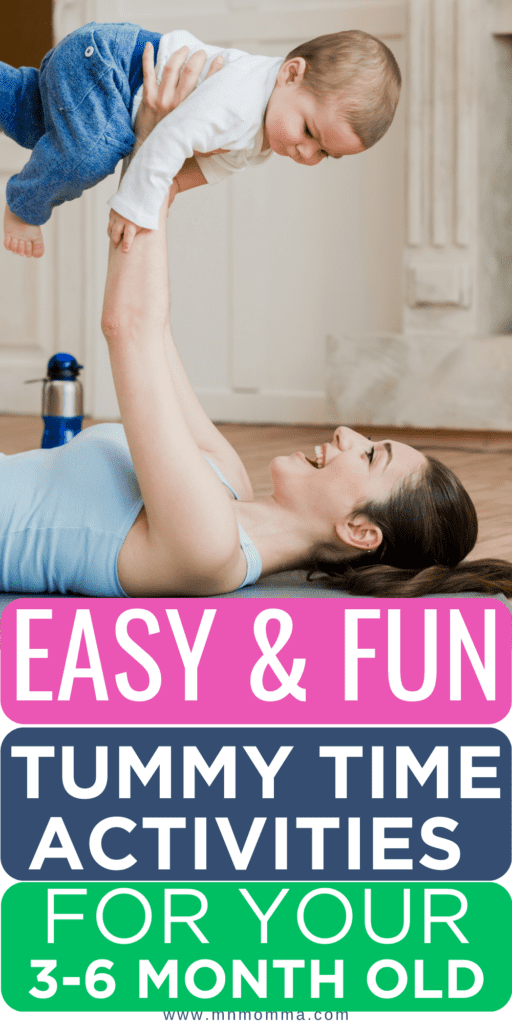
12. Tummy Time
Tummy time is one of the most important baby activities you can do, especially for babies between 3 and 6 months.
It’s essential for helping your baby develop their gross motor skills and build strong neck and shoulder muscles, which are necessary for sitting up, crawling, and eventually walking.
You can lay your baby on their tummy for short periods throughout the day, gradually increasing the time as they become more comfortable.
If your baby is getting restless in tummy time, try joining them on the floor.
And don’t forget that tummy time for 6-month-old babies looks a lot different than it might for 3 month old babies. You’ll get there!
13. Move Toys Around During Tummy Time
Some babies love tummy time, and some absolutely hate it.
So what do you do if your baby cries during tummy time?
You can try to spice it up a little bit with some new toys or excitement.
Try placing toys in different directions to encourage your baby to turn their head and work on neck and core strength.
If baby still is not having it, you can even do tummy time on your chest instead. This is great for baby’s strength and you get extra cuddles.
14. Read
Even at a young age, babies can benefit from being read to. Reading helps with language development and can also promote a love of books and learning.
I recommend choosing board books with bright colors and simple pictures that are easy for your baby to focus on.
15. Chat With Your Baby
Talk to your baby during playtime to help promote language skills and social development.
It doesn’t have to be anything fancy and might feel a little weird at first. But just TALK.
Tell her about the weather, what you’re doing, how she got her name…whatever you’d like!
If you’re feeling tired or stuck, try adding in conversations using exaggerated expressions or varying your voice to sound silly.
16. Glitter Sensory Bottle
Use a sensory bottle filled with water and glitter to promote visual tracking and sensory development. Just make sure the cover is snapped on tight.
17. Texture Explorations
Encourage your baby to touch and explore different textures during playtime.
From the feel of the carpet to the smooth wood floor, this is super simple sensory experience for your 3-6 month old.
18. Explore Faces
We love to play the get to know you game at our house with our babies.
We’ll take their sweet little hands and touch them to our faces and say, “momma”, “dadda”, etc.
19. Sing To Your Baby
Whether it’s lullaby’s or the top 20 countdown – singing to your baby is a great way to play with him and expose him to different sounds and work on important skills like language development.
20. Dance With Your Baby
Sing and dance with your baby during playtime to promote physical development. Dancing with your baby can build your bond with baby and help you have some fun at the same time.
21. Baby Massage
Massaging your baby can help promote relaxation and improve their sleep.
You can use gentle, circular motions on their arms, legs, and back, being careful to avoid the fontanelles on their head.
22. Outdoor Walks
Getting outside and going for a walk can be a great way to stimulate your baby’s senses and provide a change of scenery.
You can use a stroller or baby carrier to take your little one on a walk around the neighborhood or to a nearby park.
23. Place baby on an activity mat
This is one of many fun activities for baby that’s super simple.
Let your baby play on an activity mat and look around, kick, and reach, at the toys around her. As she gets closer to 4 months old, she may begin reaching for objects.
24. Play Copy Cat
Stick your tongue out, make silly sounds, or click your tongue and see if baby copies you.
This can be a fun game to play back and forth with your baby.
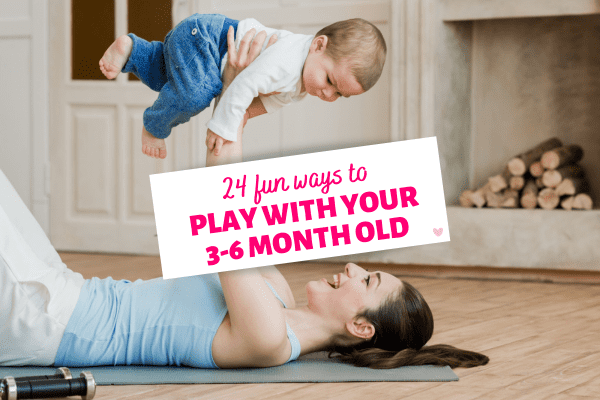
Frequently Asked Questions
How to Stimulate Baby’s Brain
Here’s a few quick tips for stimulating your young baby’s brain:
- Avoid screen time
- Talk to your baby
- Sing, dance, and play together
- Read to your baby
Try not to worry about stimulating your baby’s brain too much. As long as you’re avoiding screens to the best of your ability, and giving your baby lots of time to look around, interact with you, and learn more about their world – there’s a good chance that your baby is already learning and picking up new skills without you even having to work very hard.
What Sensory Skills Does a 3 Month Old Have?
At 3 months old, infants are developing their sensory skills and are beginning to explore the world around them.
Here are some of the sensory skills that a 3-month-old usually has:
- Vision: At this age, babies are getting better at seeing. They can focus on objects that are up to 12 inches away and can track moving objects with their eyes. They are also starting to develop depth perception and may notice his/her favorite faces in the distance (yours!).
- Hearing: Babies are born with the ability to hear, but at 3 months, they are starting to become more responsive to sounds. They might turn their head towards the direction of sounds and may begin to recognize familiar voices.
- Touch: Infants have a highly sensitive sense of touch and are able to feel different textures and temperatures.
What Are Montessori Activities 3-6 Months
Montessori activities for infants between 3-6 months old are designed to encourage their natural curiosity and promote their physical and cognitive development. Here are some Montessori activity ideas:
- Hang simple mobiles with contrasting colors and simple shapes above the baby’s crib or play area
- Tummy time
- Sensory baskets (filled with baby safe items)
- Mirror play
- Singing and reading
- Grasping and reaching
Remember that Montessori activities for infants between 3-6 months old should be simple, safe, and focused on promoting the baby’s natural development and curiosity.
Indoor Activities for Babies 4-6 Months Old
Looking for indoor activities for your 4-6 month old? Almost every activity in this article can be done indoor or outdoor depending on the temperature and weather in your area.
What To Do With A 3 Month Old All Day
If your personality is one where you thrive on structure and the days home with an infant can start to feel a little long, there are lots of simple activities you can do together. Here’s a few tips for the long days:
- Plan an outing (even just to grab a few errands)
- Go for a walk
- Schedule out your day (naps, eating times, etc.); this can be a big help to some moms!
- Read books together
- Choose a few of the activities listed above
There are a variety of different things you can do with your 3-6 month old baby that will help stimulate their senses, promote development, and strengthen your bond with them.
Remember to always follow your baby’s lead and pay attention to their cues to ensure they are comfortable and happy during these activities.
Activities for 3-6 Month Old Babies
Spending time with your baby and engaging in playtime activities can be a great bonding activity for parents and babies alike.
And incorporating these activities into your daily activities can make playtime much fun and help promote healthy development in your 6-month-old baby.
It’s important to remember that every baby develops at their own pace. If you have concerns about your baby’s development, it’s always best to seek medical advice or consult with an occupational therapist.
Related:
